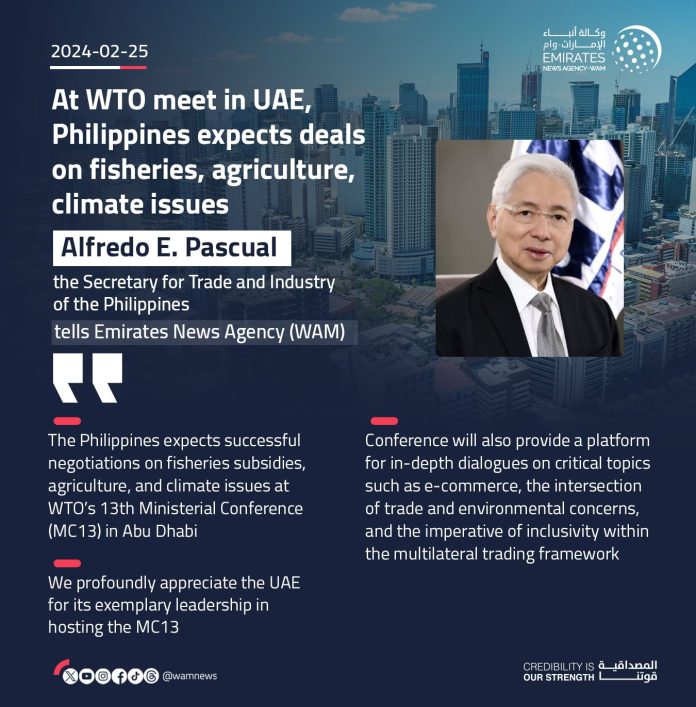ABU DHABI, 25th February, 2024 (WAM) — The Philippines expects successful negotiations on fisheries subsidies, agriculture, and climate issues at the World Trade Organisation’s (WTO) 13th Ministerial Conference (MC13) in Abu Dhabi, according to Alfredo E. Pascual, the Secretary for Trade and Industry of the Philippines.
“I am particularly enthusiastic about welcoming Comoros and Timor-Leste as the latest additions to the WTO, signifying the culmination of the second phase of negotiations on fisheries subsidies,” he told the Emirates News Agency (WAM) in an email interview from Manila.
Additionally, Pascual expressed his hope that MC13 would reach significant agreements in agriculture, “focusing on enhancing food security, a concern that is paramount for many nations”.
UAE’s vital role
The UAE will host MC13 from 26th to 29th February 2024 in Abu Dhabi, after successfully organising COP28, the UN Climate Conference in Dubai in December 2023.
Around 164 nations and trading blocs will participate in the Ministerial Conference, the WTO’s top decision-making body, which meets usually every two years.
“The Philippines profoundly appreciates the UAE for its exemplary leadership in hosting the MC13,” said Pascual who will be the head of the Philippine delegation to the conference.
The vital role the UAE has assumed, he pointed out, particularly after the momentum garnered from MC12 and the fruitful senior officials’ meeting in October, sets a stage ripe with promise for substantial progress and continued vitality in the WTO’s endeavours.
E-commerce, WTO reforms
The Philippine official said the conference will also provide a platform for in-depth dialogues on critical topics such as e-commerce, the intersection of trade and environmental concerns, and the imperative of inclusivity within the multilateral trading framework.
“These discussions are crucial for ensuring a balanced and progressive global trading system.”
The Philippines has been a staunch advocate for the reform and modernisation of the WTO, with a particular emphasis on bolstering the development aspect of the discussions, Pascual stressed.
“I am optimistic that this conference will mark a significant step forward in these essential areas, reflecting our collective commitment to a more equitable and sustainable global trade environment.”
Climate issues
The challenges of climate change are among the most formidable that the global community must confront, and the Philippines, as a country acutely vulnerable to its impacts, is resolute in leveraging the multilateral trading system to mitigate these effects, the official asserted.
“Our dedication is evident in our proactive stance on promoting sustainable trade practices, facilitating the exchange of eco-friendly goods and services, and actively pursuing alliances with other WTO members who share our vision of integrating trade and environmental sustainability.”
The urgency of this endeavour cannot be overstated, Pascual emphasised.
The WTO is strategically positioned to expedite the global trade of climate-smart technologies, which are instrumental in driving the shift towards renewable energy—a shift that is particularly crucial for developing and least-developed countries (LDCs) in their pursuit of economic growth and sustainability, he explained.
“Furthermore, our engagement in these environmentally-centred trade initiatives goes beyond the immediate response to climate change. It also catalyses investment, spurs job creation, and reinforces food security.”
These are holistic benefits that contribute to a resilient global trading system, one that is capable of supporting the collective transition to a greener economy, the official added.
Philippines-UAE relations
Pascual commended the UAE for its strategic initiatives to enhance the trade relations with economies worldwide, reinforcing the country’s position as a global trade and logistics hub.
The series of Comprehensive Economic Partnerships (CEPAs) signed with several countries exemplify the UAE’s expansive trade vision, he pointed out.
The UAE has concluded CEPA with 11 countries such as India, Indonesia, Israel, Türkiye, Cambodia, South Korea, Colombia, Georgia, Mauritius, Congo-Brazzaville and Costa Rica. The first five agreements have already come into effect.
The Philippine official noted that recent agreement on the terms of reference for the Philippines-UAE CEPA marked a milestone, promising to enhance trade and investment flows with the UAE and the broader Gulf region.
The CEPA will foster greater opportunities across various sectors, including construction, energy, and logistics, he added. “It aligns with the Philippine Development Plan’s objectives to widen our Free Trade Agreement network.”
The potential for collaboration between the UAE and the Philippines is immense, and the MC13 provides an excellent platform to explore these opportunities further, Pascual stressed.

